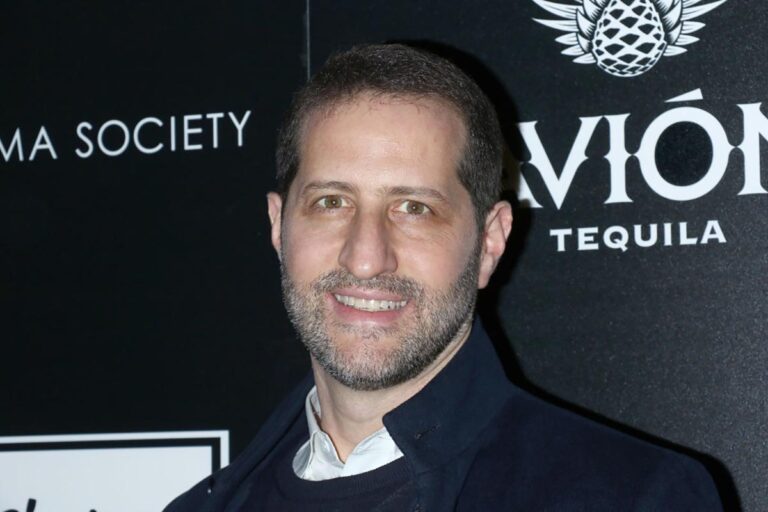
Modi Rosenfeld is well-known to anyone who has attended a Jewish fundraiser — at least, that’s how he introduces himself during his comedy routines.
The 53-year-old Israeli-American comedian speaks at length about the Jewish community’s love of fundraisers, joking about his experiences as a performer at dinners to benefit Jewish causes.
Now, his comedy tour has become a fundraiser of sorts. Rosenfeld plans to donate a portion of proceeds from his upcoming tour to several organizations he previously worked with including United Hatzalah, Magen David Adom, and UJA.
Ahead of his tour, which kicks off on Feb. 15, Unpacked spoke to Rosenfeld about the inspirations behind his comedy — and why we need mashiach energy now more than ever.
Read more: 6 Jewish comedians to watch in 2024
Rosenfeld wants to give his audience a respite from the news about the war
Rosenfeld, who was called “the next Jackie Mason” by the New York Times, is using his platform to give some relief to his Jewish followers, who have been inundated by war news stories, along with feelings of fear and sadness for their loved ones and other victims of the war.
“My goal is just to give people an hour and a half of not being in the war. So during the show, I don’t talk about the protests, I don’t make jokes about ‘from the river to the sea,’” Rosenfeld, who is based in New York City, said. “People feel guilty for having that hour and a half of laughing.”
While he said that there is an angle to be funny and joke about the spike in antisemitism and anti-Israel sentiments, he said there is no way to make those jokes without reminding people what is going on in Israel and Gaza.
The Israeli-born comedian instead focuses on jokes revolving around the differences between Ashkenazi and Sephardi Jews and specific honorees at Jewish dinners. While he does discuss wartime fundraisers, he makes sure to steer away from discussions of violence.
His only joke about Israel during the war is when he remarks that when Oct. 7 occurred, he was staying in the same hotel as Bruno Mars in Israel. Rosenfeld joked to his husband that the biggest tragedy would be the singer’s death overshadowing his own.
Rosenfeld’s hope is that people are able to embrace their sense of humor during his show, explaining, “If you’re not happy, you cannot be a well-functioning Jew.”
To achieve this goal, the comic — who left an investment banking career to pursue standup comedy — has also crafted his social media to reflect a sense of Jewish pride and lightheartedness.
He wants people to be able to watch clips and laugh, which is why he tends to keep imagery of the war in Gaza off his page.
However, Rosenfeld does use his platform to support those fighting in the war and Israeli victims. Friends of the Israeli Defense Forces and the Kobe Mandel Foundation, which supports families of terror attack victims, are organizations he also plans to donate to on his upcoming tour.
Rosenfeld takes inspiration from legendary Jewish comics
Rosenfeld’s set is constantly changing based on current events. Jokes are frequently edited from show to show to be punchier and more timely. His husband and manager, Leo Veiga, often helps Rosenfeld refine and enhance his jokes.
The comedian, who moved to Long Island from Israel when he was 7, claims his Jewish identity has shaped all aspects of his comedy; his act centers around the Jewish community, as does his podcast, “And Here’s Modi.”
When asked, Rosenfeld said he identifies as a “Jewish comedian” rather than a “comedian who is Jewish.”
“That’s my identity,” he said, frankly.
“When you watch Jerry Seinfeld, he’s Jewish and he’s a comedian. It’s not Jewish, even though he is Jewish, because it’s without the Jewish angle,” Rosenfeld added. “My jokes are based within Judaism [and] made for Jews and people who aren’t Jewish to understand Judaism.”
The distinction between Jewish comedy and comedy told by a Jew boils down to the context of the joke, according to Rosenfeld. He believes that Jewish comedy should give the audience a glimpse into the Jewish experience and should not be universal in its context.
“I’m an observational comedian. I observe things and talk about them. And it gives someone who’s not a Jew a window into how we view things,” he explained.
“As an Israeli-American, Orthodox, gay man, I view the world in my eyes. And so someone who’s not Jewish is getting a window into the Jewish world, and those who are Jewish are seeing the world with my twist on it,” Rosenfeld said.
In addition to his comedy being rooted in the Jewish experience, Rosenfeld honed his comedic timing by attending live shows of old-school Jewish comics like Jackie Mason and Alan King, the latter of whom he had the privilege of working with.
“I was very lucky to catch the end of the Catskill era when I began doing comedy. Old-school comedians are the ones that really affected me, and my timing, pacing and the cadence of my comedy,” Rosenfeld said.
Rosenfeld wants people to tap into “mashiach energy”
Moshiach energy has become a defining theme for Rosenfeld. Although “mashiach” means messiah in Hebrew, the concept holds a non-religious significance for the comedian.
For Rosenfeld, “mashiach energy” represents a belief that one’s actions should be driven by kindness, empathy and love. To tap into this mashiach energy, they must engage in mitzvot (good deeds) and strive to be a positive influence on those around them.
“Mashiach energy is something you can create; it’s a mixture of unity and of harmony. At a show, you’ll see…people laughing together, experiencing something in harmony. It’s all kinds of people — not Jewish, Jewish, Sephardic. Ashkenazi religious, not religious — all having the same moment,” Rosenfeld said.
How can someone increase the “mashiach energy” in their life? Rosenfeld believes the first step is simply being kind to oneself and others and actively seeking opportunities to spread kindness through good deeds whenever possible.
One moment in all his shows that Rosenfeld believes is peak mashiach energy is when he encourages his audience to sing “Hatikvah” along with him after the performance.
In Israel, bar mitzvahs and weddings often conclude with a rendition of the Israeli national anthem, and Rosenfeld saw his shows as an opportunity to uphold this tradition.
“Every time I’m in Israel for [a family event], it always touched me that ‘Hatikvah’ is how we ended the evening. I just am so happy that I can give a moment to bring that tradition back to the U.S.,” Rosenfeld said. “It gives the audience a moment to refocus. We just had an hour and a half of laughing at a very difficult time, and ‘Hatikvah’ brings the focus back to Israel.”
Read more: Comedian Elon Gold explains the success behind “The Chosen Comedy Festival”
Originally Published Feb 1, 2024 09:14AM EST
